The keyword research is one of the pillars of the strategy for SEO content. Perhaps the most fundamental pillar because it is where the work of organic positioning begins.
It is true that we first have to define the topics we want to talk about, but, equally, the keyword research may cause us to have to open the field or vice versa.
It will be at that moment that you will realise whether your idea of content plan made sense or needs to adapt to the demands of the audience.
Because something very important that you have to engrave in your mind is that SEO is more science than literature. Literature helps, but it alone will not bring you to a content position.
It's not just about writing well, it's about finding your space and once there, providing useful content for the user. It will help if it is well written because no one will trust poorly written content and we have already mentioned that the user experience and its confidence is key to the SEO.
But, as always, I like to start with the basics. Let's go there and then continue with the best tools and the most interesting strategies to achieve an keyword research competent.
What is keyword research?

The keyword research o keyword research is a process of searching for keywords, related keywords, volumes and level of competition for the topics we are going to write about.
The keyword research can be used to create a content plan but also to research a single word or topic.
When we make a keyword research we are checking the performance of one or more keywords and our chances of ranking for it.
In other words, imagine, for example, that you own a travel agency and you want to making a content plan. The first step is to have delimited what you want to sell. It can be, for example, trips for stag and hen parties, honeymoons, backpacking trips, luxury trips, weekend getaways, etc....
You can also narrow down the geographical scope, for example honeymoons in Tanzania or weekend getaways in Spain.
It doesn't make sense if you are a travel agency focused on Spain to research keywords from other countries or if you specialise in luxury, to create content for backpackers.
Of course, this is also where the creativity. Even if it is not directly related to what you are selling, useful travel information such as vaccinations and visas, gastronomy, wardrobe tips, etc... can help you achieve your goals.
Perhaps this is also the most important thing, a keyword research should be subject to specific objectives. But we will discuss this in the next section.
What is it for?

The keyword research is used to find the right keywords to generate traffic and/or conversions for your site.
This is another aspect you need to be clear about when doing your research. If you need only trafficyou will have more words at your disposal than if you require conversionswhether it's sales, downloads or whatever your goal is.
In any case, it is important to bear in mind that a good keyword research takes into account all the SALES FUNNEL of the user.
When you make your content strategyEven if your objective is, to return to the previous example, to sell trips, it is not enough to use transactional or descriptive words about the trip.
Anything that requires a user action on your site requires trust and with the keyword research we can see how we can gain that trust. What are you looking for, what are you interested in (related to our field) and how can we tell you:
-Hey, we're here! We can help you!
This is why it is also good to offer information that, although it will not generate conversions, will make them start to become familiar with our brand.
Subsequently, the user will come back to us when he/she has decided to buy/download what we are offering (thanks to the SEO work in other keywords) and we will multiply our chances of conversion.
That's right, you can't forget that SEO is a time-consuming job.. First for positioning your keywordsThe user can then go through the entire route.
If you want to immediate resultsthen opt for SEM and not by the SEO. It's like the difference between buying tomatoes and planting a tomato plant. The tomato plant will be cheaper in the long run, but you have to let it grow.
Free keyword research tools
Having introduced the subject, let's get down to business. How to do keyword research?
Well, first of all it will depend on whether you have the resources to pay for a tool or whether you have to use a free tool.
You can do good keyword research with free tools. The only problem is that it will be much slower and somewhat less reliable. Even so, if we do not have the resources at the moment, there are options available to us.
I am going to tell you about the four most interesting ones.
Answerthepublic
Answerthepublic is perhaps the easiest and most intuitive of all. Translated as "your audience answers", it allows you to see at a glance which questions and long tail keywords have the most searches.
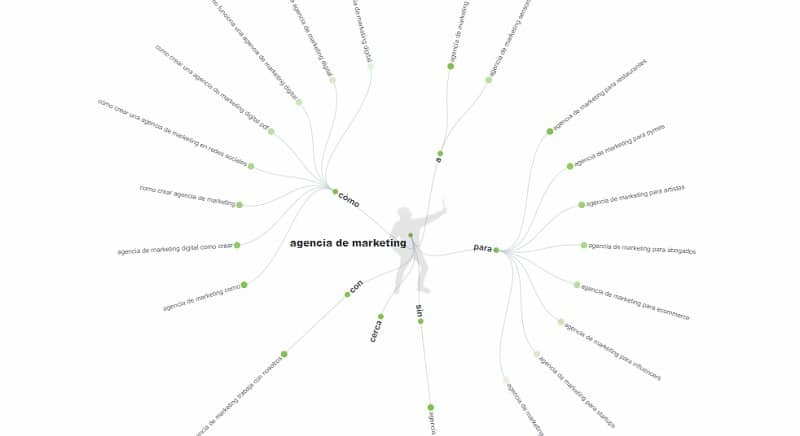
All you have to do is enter your keywordThe first of the graphs has to do with questions, the second with prepositions and the third with comparisons. The first graph deals with questions, the second with prepositions and the third with comparisons.
You will see that different options appear with a green dot that increases in intensity as the volumes get higher. In other words, the more intense the green dot, the more people are searching for that particular question.
In addition, you can view the list, both alphabetically and by preposition, to see which keywords would be good for you to consider.
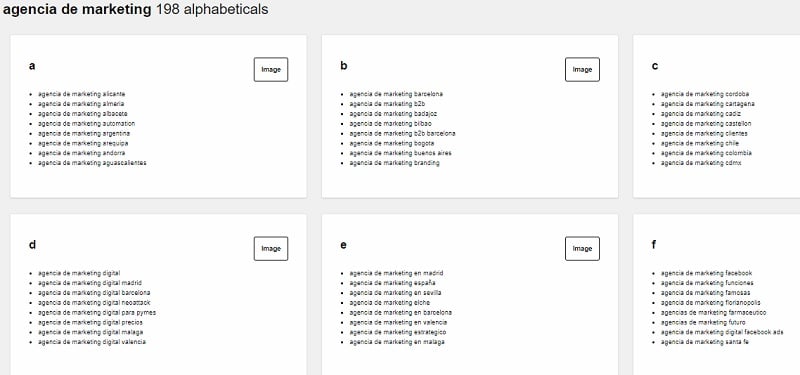
Sounds good, so what's the problem? In this case mainly that we can't see what the actual search volume is for each keyword and, on the other hand, that the intensity of the green that indicates it is in relation to other words related to our main keyword.
Let me explain. You can only see what long tail keywords are better for a specific keyword, but you cannot compare its search volume with that of a different keyword. we add at a later stage.
Turning to travel, we can see if there are more searches for "when to travel to Italy" or "what to take to travel to Italy", but you will not know if words related to travel to Italy have more searches than words related to travel to France or Tanzania.
However, this is something we can do with the following free tool.
Ubbersugest
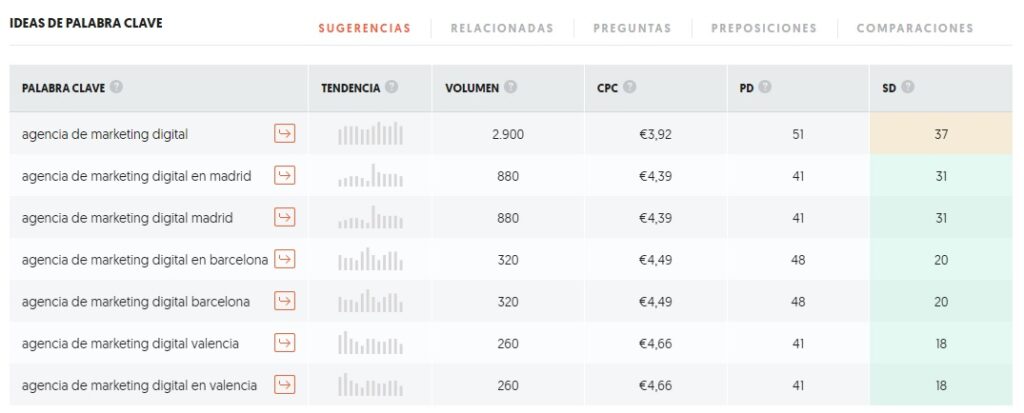
Ubbersugest is quite an interesting tool if you can't pay. It has almost all the functionalities we need, but it is quite slow and usually gives a lot of errors.
Personally, I have used it a lot before I was able to switch to the payment instruments.
You have several options that may be of interest to you, such as viewing the main keywords of any domain in its Domain analysis (it can help you to study the competition), the main SEO pages or, what interests us at this point: keyword suggestions.
In this case we will have volume and difficulty data (SD), so it will be easier to make decisions. In addition, you will see the average cost per click if we go to SEM and a small graph of the search trends.
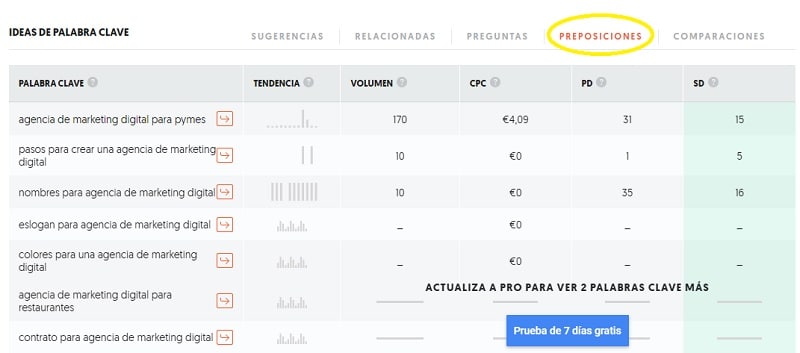
As in the case of AnswerthepublicIf you are looking for a specific language, you can look at comparisons, questions, related or prepositional questions, to make sure you make the right choice.
In return, in the free version, you have a maximum of 3 searches per day.so it's easy to fall short. A few years ago you could search for anything you wanted, but recently their model has changed.
Keyword planner
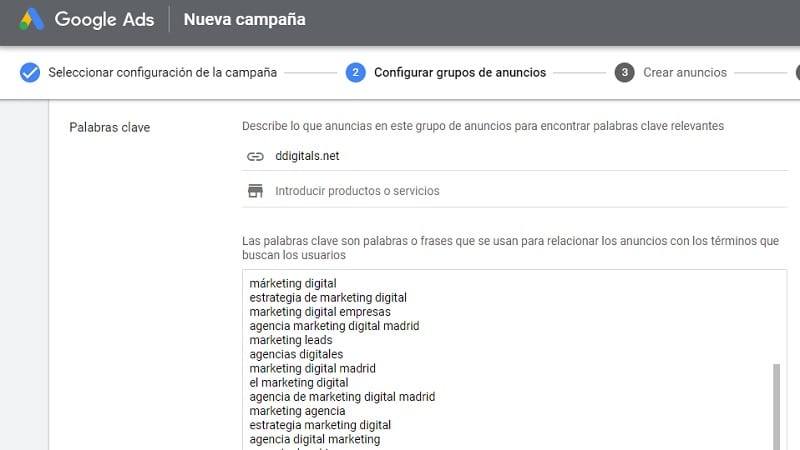
A classic when it comes to keyword research is the Google Ads keyword planner. In this case, the problem is that you need to have an active Google Ads account to be able to use this functionality.
In addition, you must create a advertising campaign (although it is not necessary to start it up).
Just enter the website and you will see the keywords more interesting. Later you will be able to enter your own words and see the Search volume and other recommendations from Google.
In this case, it should be borne in mind that this is a tool designed for SEM, but it can be used to see the volumes handled by Google, which are more reliable than those of any other tool.
The problem is that the daily clicks are calculated with respect to the ad and the investment, so the results will be somewhat different.
Google Trends
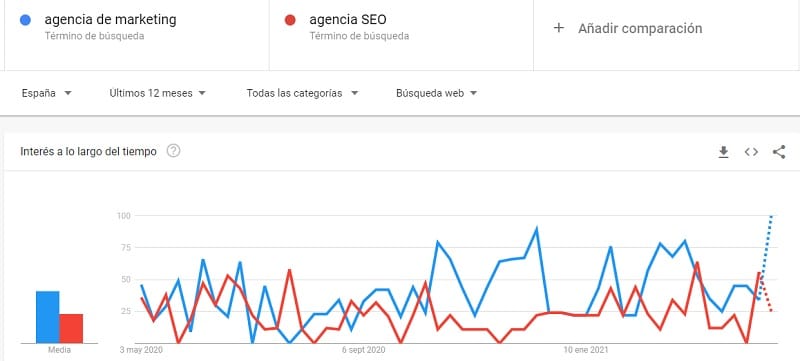
Finally, there is a tool that will also be quite useful. It is Google Trends. In this case, we are dealing with a completely free tool with which we can consult the search trends for a keyword.
For us to understand, there are words that are searched for more during a certain time of the year, while during the rest of the year searches decrease. This is obvious with holidays such as Christmas or times such as elections, but it can also be used to check how a crisis has affected or when the recovery begins.
Álvaro Vázquezin his article on how the tourism sector can recover from the impact of COVIDI gave some very illustrative examples.
With Google Trends you can see the trend of a word over time. This way you will know if it is a seasonal word or if it maintains a constant volume of interest throughout the year. In addition, you can also compare several different keywords.
If you have doubts between two keywords, you will be able to see the volume of each one not in a static way but in a sustained way over time. to know, for example, whether one is growing or declining compared to another term.
SEO is constantly changing and being able to stay ahead of words that are going to have a good search spike is a good strategy.
Payment tools
Leaving aside the free tools, with the payment instruments we will be able to make a keyword research in a much easier way. There are quite a few different tools that we can use and they have a lot of different functionalities, but I am going to tell you about my two favourites.
In addition, the two free tools we talked about in the previous point have their own paid version. Personally, I have only used the free version, so I cannot tell you whether it is worth it or not.
The ones I do use, and practically on a daily basis, are SEMrush and Ahrefs. They are super wide and complete tools that have a lot of interesting options to control and monitor your projects, especially in everything related to SEO.
Even so, this is not a tutorial, so I'm just going to tell you about the most interesting features to make your keyword research.
SEMrush
At SEMrush we have to separate the research part from the research part. SEO competence The keyword research, although both can be very useful to us.
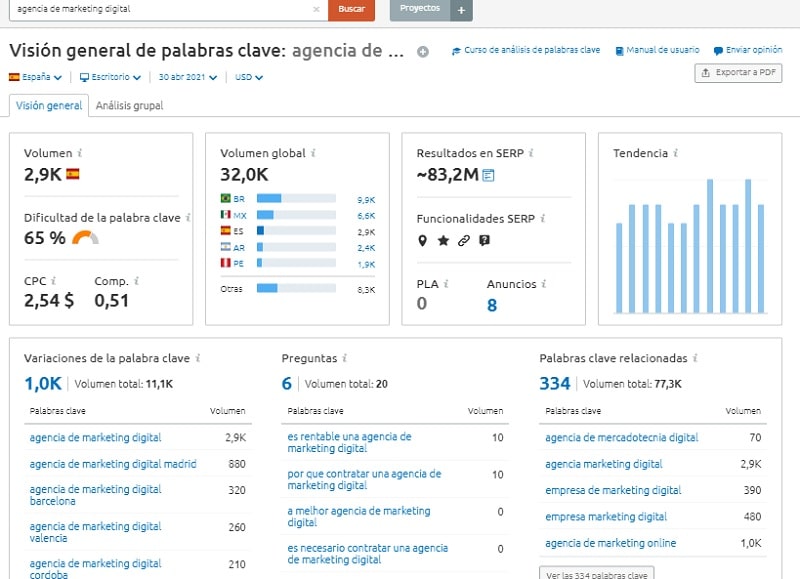
In the section on Overview of keywords you can research up to 100 keywords at once, making it a useful and effective tool. For each one of them you will get its national and international volume, competition, cost per click, estimated difficulty, trend, etc...
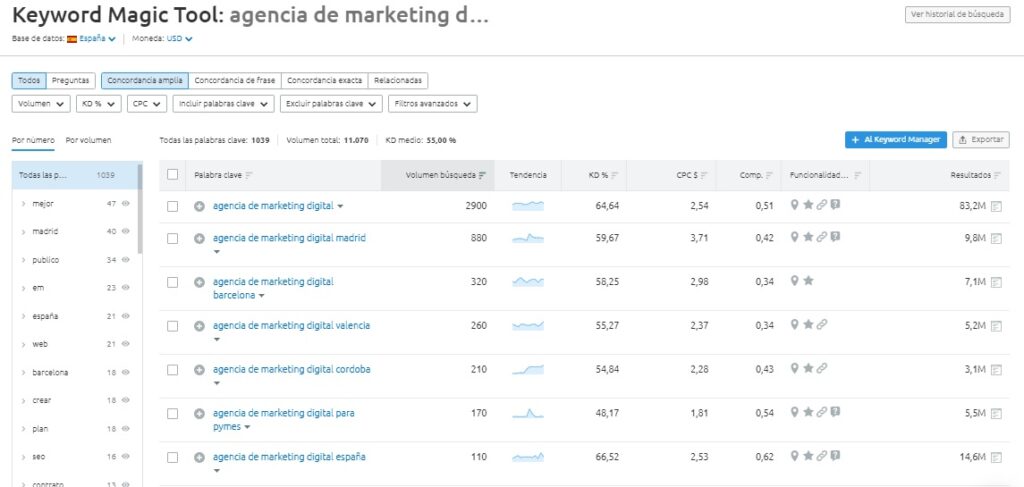
If we use the Keyword Magic Tool we will be able to see it in a long list, also being able to select between questions, exact match, phrase match, related, etc... with the possibility of including advanced filters.
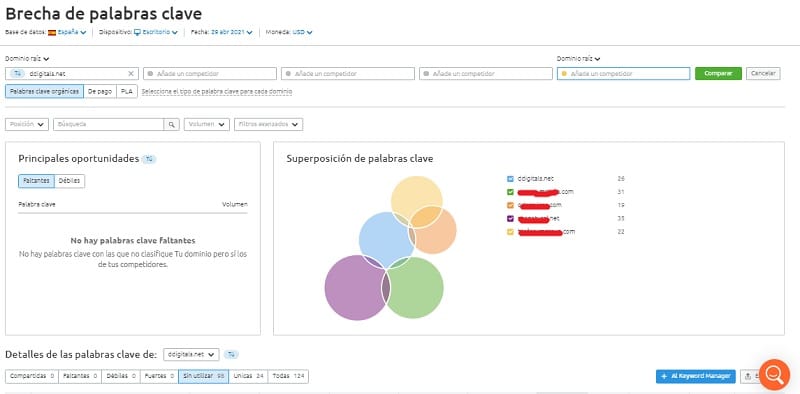
In the competence section I have to pointing out the keyword gap. This functionality is ideal for finding opportunities that we may have missed. Just add the domains of your direct competitors and you will be able to see a graph and a list of the keywords you share, those shared by your competitors and the opportunities you have not yet used.
Nor can I forget the Position Tracking reportThis is a tool through which you can monitor the keywords you have used, the position they are in, the volume of the keyword and the estimated traffic it is generating.
In short, we are faced with a all-in-one SEO toolThis will help us a lot to refine our selection of the right keywords.
Ahrefs
Very similar to SEMrush is Ahrefs. It is always important to compare between the two (if we have them) because sometimes the data differ from each other and can help us to get an idea. Keep in mind that even if they are quite reliable, the data are estimates based on algorithms and nobody knows what exactly is going to happen the following month.
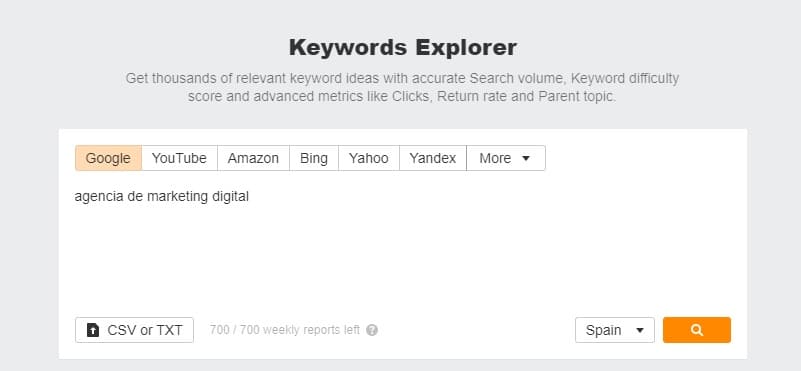
In this case, our target is in its Keyword Explorer. One of the clear advantages of Ahrefs in the face of SEMrush is that we can also look for performance in Amazon, Youtube or even YandexIt may therefore be more useful in specific cases.
Youtubefor example, is the second most used search engine in the world, so having a content strategy specific to the video portal can work very well in certain cases.
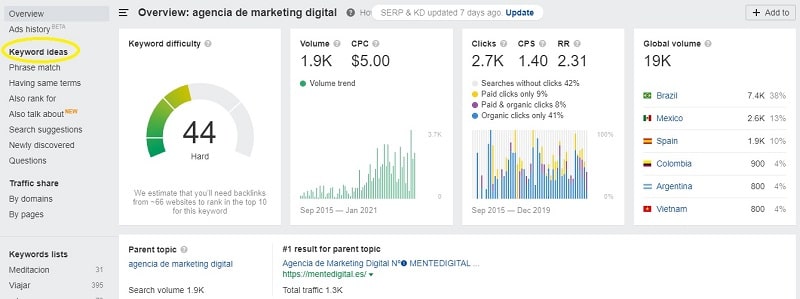
The keyword search section is similar to the data we can find in SEMrush but it has some differences that I am going to discuss. The most important is that calculates the backlinks you would need to place the keyword in the Top 10.
It also calculates the clicks that have been produced, separating those coming from SEM and those coming from SEO, as well as the first result at that moment.
On the other hand, in the right column we have the keyword options that we have already discussed in SEMrush to see related words. We can also see trends, volume, etc... with each one.
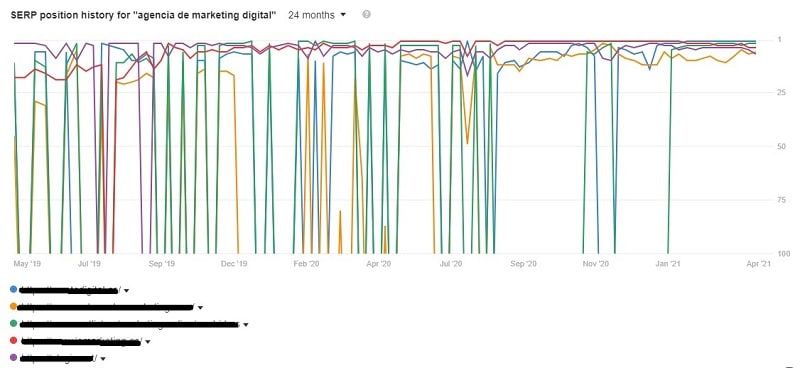
We can also see some graphs with the history of the top 10, seeing what positions the pages that currently occupy it have had, when they entered, etc... which is quite interesting to draw conclusions. Below the graph you can also see the results.
It is always interesting to see what content is in the top positions in order to find out more about it. related keywords and words of the semantic field that will help us in the elaboration of the content for SEO.
Competition, yes or no?
As I mentioned, with the above tools you can see what keywords your competitors are ranking for. You can also pull out related ones that have not yet been used or indexed.
Then, is it a good idea to use your competitors' keywords? This is a question that has several nuances.
If we find keywords that interest us, with a volume in line with what we are looking for and that do not have strong competition, my advice is to go for it.
However, in the midst of 2021 this is not common. The easy keywords or "free" will be words that will be very long tail and are likely to have very low search volumes.
In SEO you have to be ambitious So I recommend also going after the keywords that your competitors have. See what they have achieved and see how you can improve it. Remember that you have to be useful to the user.
If you manage to be more useful, you will have taken the first step to put yourself above and not only position yourself, but also gain market share over your direct competition.
Of course, the loading speedthe number of backlinksThe server, the server, etc... will also influence the positioning. But, of courseIf the content is not better, you will not be able to steal those positions..
Therefore, it tries to find a balance and compete for the words for which you are sure you can bring the most value to the user.. If this is not the case, try to make room for yourself in the spaces that are available. With a good keyword researchYou will find these gaps even in the most competitive sectors.
Volumes in keyword research

The volumes is another important aspect. In a keyword research It's not just about choosing the words with the highest search volume, but about being strategic.
It would be great to be able to go after a keyword with thousands of searches per month from scratch, but I'm telling you, you're not going to get anywhere. At least not if you don't have the budget to get a hundred or so backlinks quality on a sustained basis.
If our website has a good domain authorityIf you have already positioned keywords and a certain age, it will be easier to position words with higher volumes. Otherwise, we will have to go little by little, starting with low volumes until we are positioning and gaining traffic little by little.
Afterwards, once there is a good foundation with a lot of content related to a high volume keywordwe can go for it. You can also go before and then go creating related content to try to position it, but be clear that if you have just created your website you are not going to be able to position a highly competitive term.
Also, keep in mind that even if a term is easy to rank for, quality is key. If the user does not find what they need, Google will end up penalising you, you will lose position and it will be even more difficult to achieve it with the keyword you are really interested in.
Follow your intuition
Finally, let me give you some advice. Using the tools is all very well and having all the data is all very well, but there is a qualitative section that you can't forget.
The business intelligence is also extremely important when it comes to making a keyword research and this is also where your intuition comes in. If you have two keywords with similar searches and you don't know which one to choose, both of which are suitable for your business, let yourself go.
If you feel that a keyword that seems a little worse is going to work better than one that seems a little better, let yourself go. When it comes to writing, all these aspects are reflected in the text and end up being transmitted to the person who reads it.
I've said it before, but I'll say it again, if we connect with the user, we've done most of the work. So dare to connect. Don't forget the data, but at the same time, leave some room to dream. That's the only way to make it big.


